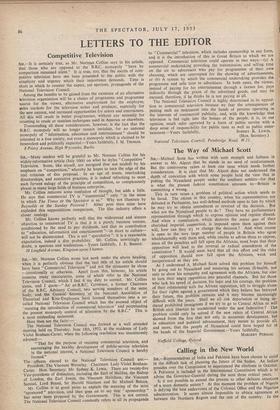The Way of Michael Scott
SIR,—Michael Scott has written with such strength and fullness in answer to Mr. Alport that he stands in no need of reinforcement. But the controversy raises at least one issue which needs further consideration. It is clear that Mr. Alport does not understand the depth of conviction with which some people hold the view that in putting the Nyasaland people under the southern settlers—for that is what the present federal constitution amounts to—Britain is committing a wrong.
This in turn raises a problem of political action which needs to be faced. The citizen in this country, when his representatives are defeated in Parliament, has well-defined methods open to him by which he may try to obtain amendment or reversal of the decision. But what are the Nyasaland people to do ? They have no parliamentary representation through which to express opinion and register dissent. And when a constitution, which destroys the status quo of their cherished imperial connection, is imposed upon them against their will, how can they try to change the decision ? And what course is open to the very large number of people in Britain who agree wholeheartedly with them and, while unable to advise them to oppose, since all the penalties will fall upon the Africans, must hope that their opposition will lead to the reversal or radical amendment of the constitution ? It would seem hard that all this effort and the risks of opposition should now fall upon the Africans, weak and inexperienced as they are.
As I understand it, Michael Scott solved this problem for himself by going out to Nyasaland and mastering his serious ill-health, not only to show his sympathy and agreement with the Africans, but also to turn their angry opposition into peaceful channels. But for those who lack his speed of decision, his logic and his courage, the problem of their relationship with the African opposition, left to struggle alone for their rights against a government which they believe has betrayed their future, this problem remains and it may become increasingly difficult with the years. Shall we all risk deportation or being de- clared prohibited immigrants if we try to go to Central Africa or will British civil liberties be maintained under the new federation ? The problem could only be solved if the new rulers of Central Africa showed from the first that not only in economic development, but in education and political advancement, they meant to provide all, and more, that the people of Nyasaland could have hoped for at the hands of the Imperial Government.—Yours faithfully, Nuffield College, Oxford.
MARGERY PERHAM.


























 Previous page
Previous page